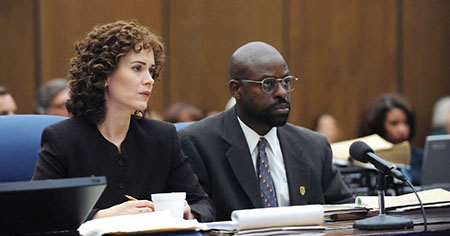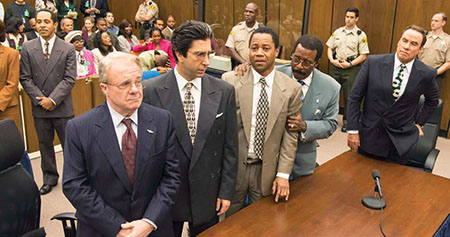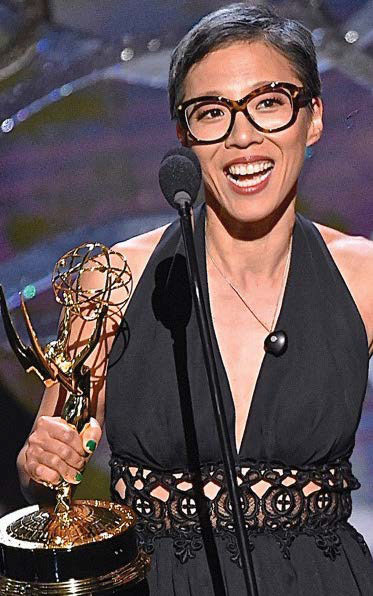Music Assists in Setting the Scene
The professional video industry's #1 source for news, trends and product and tech information. Sign up below.
You are now subscribed
Your newsletter sign-up was successful
The FX Networks’ hit, “The People v. O.J. Simpson: American Crime Story” was one of the most successful cable shows ever produced, and the most-watched episodic in FX Networks’ history. Averaging 13.19 million total viewers to date across all linear and nonlinear platforms could be one reason that when the Emmy Awards were handed out in September it earned five statuettes.

(L to R) Sarah Paulson as Marcia Clark, Sterling K. Brown as Christopher Darden in “The People v. O.J. Simpson: American Crime Story.”
Credit: Ray Mickshaw/FX In addition to the much-anticipated primetime Emmy Award for Outstanding Limited Series, the awards included a Creative Arts Emmy for Outstanding Single-Camera Picture Editing for a Limited Series or Movie being handed to editor C. Chi-Yoon Chung, specifically for her work on the episode titled “The Race Card.”
Chung acquired the leading “C” initial in her credit after she and her family emigrated from Korea when she was five, at which time her mother thought Chung ought to have an American name such as “Caroline.”
“Like one of the other editors said, having a leading initial makes you sound smarter,” Chung laughed. “Would F. Scott Fitzgerald be the same as just ‘Scott’?”
EDITORIAL CREATIVITY
But it is Chung’s editing skills that this columnist is interested in. Her work on the O. J. Simpson series is filled with examples of her editorial creativity. Let me flag a major spoiler alert here, because one of the most impactful contributions she found in the edit bay while working on this show comes right at the end of “The Race Card” episode,.
The example of Chung’s edit bay alchemy I want to celebrate comes in the final two scenes of “The Race Card.” While the content comes from 2016 Emmy-nominated writer Joe Robert Cole’s script, and the context and performances are driven by director John Singleton, the hammer-like whomp of the scene’s final impact was generated when editor Chung told her assistant, Franzis Muller, “Get me some Wagner.”
In the sequence we see lead prosecutor Marsha Clark (2016 Outstanding Lead Actress Emmy-winner Sarah Paulson) in her office confronting co-counsel Christopher Darden (actor Sterling K. Brown) over which of them should examine contentious witness Detective Mark Fuhrman (played by Steven Pasquale) who had previously said one of his hobbies was “collecting World War II memorabilia.”
The professional video industry's #1 source for news, trends and product and tech information. Sign up below.
Cut to some skyline shots of Los Angeles at sunset, and Furhman walks out of a blur into a tight facial closeup. But all this time, since the end of the office scene, we have been hearing the strains of the overture to Wagner’s “Die Meistersinger” rising up on the sound track. Furhman reaches into his trophy case, and as the Wagner music reaches its crescendo we see him reach toward his “World War II memorabilia”—a Nazi iron cross medallion. The final cadence of Wagner climaxes as we cut to black.
“That music seemed to me something that the scene just called for,” Chung recalled. “The people at FX Network liked the way it worked, so we left it in.”

(L to R) Nathan Lane as F. Lee Bailey, David Schwimmer as Robert Kardashian, Cuba Gooding, Jr. as O.J. Simpson, Courtney B. Vance as Johnnie Cochran, John Travolta as Robert Shapiro in “The People v. O.J. simpson: American crime story.”
Credit: Prashant gupta/FXWHERE IT STARTED
Most successful editors bring a multifaceted background with them into the edit bay, so maybe the genesis of this Creative Arts Emmy can be traced back to the years Chung studied at the University of Hamburg from 1991–93, when she considered becoming a dramaturg for a European theater troupe.
She landed a job at the Gersh Agency in New York, which put her on the fringe of the entertainment biz. An internship at Good Edit gave her access to Avid Media Composers where she learned to fix, troubleshoot and run the NLE that would dominate the TV industry.
Chung gypsied around assistant editing gratis on any gig she could get until she earned her union card on “Stepford Wives,” along the way honing her chops under documentary editor Nancy Baker on a 2005 feature called “Havoc” and the IMAX “Roving Mars” project.
“I was a features assistant for a really long time,” Chung said, “but what I needed was a steady paycheck. So in 2009 my husband Lawrence Corradini and I settled in Los Angeles and I got my foot in the door assisting on ‘The Good Wife’ where I worked with a great editor, Matthew Kregor.”
While assisting on “The Following,” Chung’s friend Rosie Tan Collelo brought her onto “The Stalker” and after 20 years assisting she found herself finally in the editor’s chair. When that show closed, she interviewed at Ryan Murphy TV where “American Crime Story” was being produced.
Adam Penn edited three episodes of “The People v. O.J. Simpson: American Crime Story,” Stewart Schill another four and Chi-Yoon Chung cut the remaining five.
“We were in a separate building from the rest of post production so we were left alone to do our editors’ cuts,” Chi-Yoon said. “FX Networks gives us a lot more freedom than most networks.”
However, to save money, a lot of the shooting was cross-boarded so shots from disparate scenes could be recorded at the same time when the crew were on a given location.

C. Chi-Yoon Chung “That made the sequences in ‘The Race Card’ that took place at the Simpson’s house especially hectic since the defense team completely redecorated O.J.’s Rockingham domicile before the jury visit to make him look more ethno-centric,” she said. “Director John Singleton did a great job keeping everything straight despite all the costume changes.”
For Chung, the most challenging scenes were the confrontations between Johnnie Cochran (played by Courtney B. Vance) and Chris Darden.
As she described it, “We’d have these long speeches shot with multiple cameras, so to keep the conflict sharp I had to play the emotions off their reactions. I’d look for the important lines during their face-off, especially when Darden was trying to get the ‘N’ word banned.
I’d take extensive notes during dailies, marking key camera moves, cutaways and intense moments that revealed their emotions. These became so spiked that prosecutor Bill Hodgman (Christian Clemenson) was shown collapsing in court from a presumed heart attack. Although the real Hodgman only retired with severe chest pains, the moment represented a very human, but also a very complex, scene.”
The whole Simpson drama was indeed human and complex, but when you see “The People v. O.J. Simpson: American Crime Story” in reruns or on the web, you’ll see why it became fodder for an incredible work of drama.
Jay Ankeney is a freelance editor and post-production consultant based in Los Angeles. Write him atJayAnkeney@mac.com.
